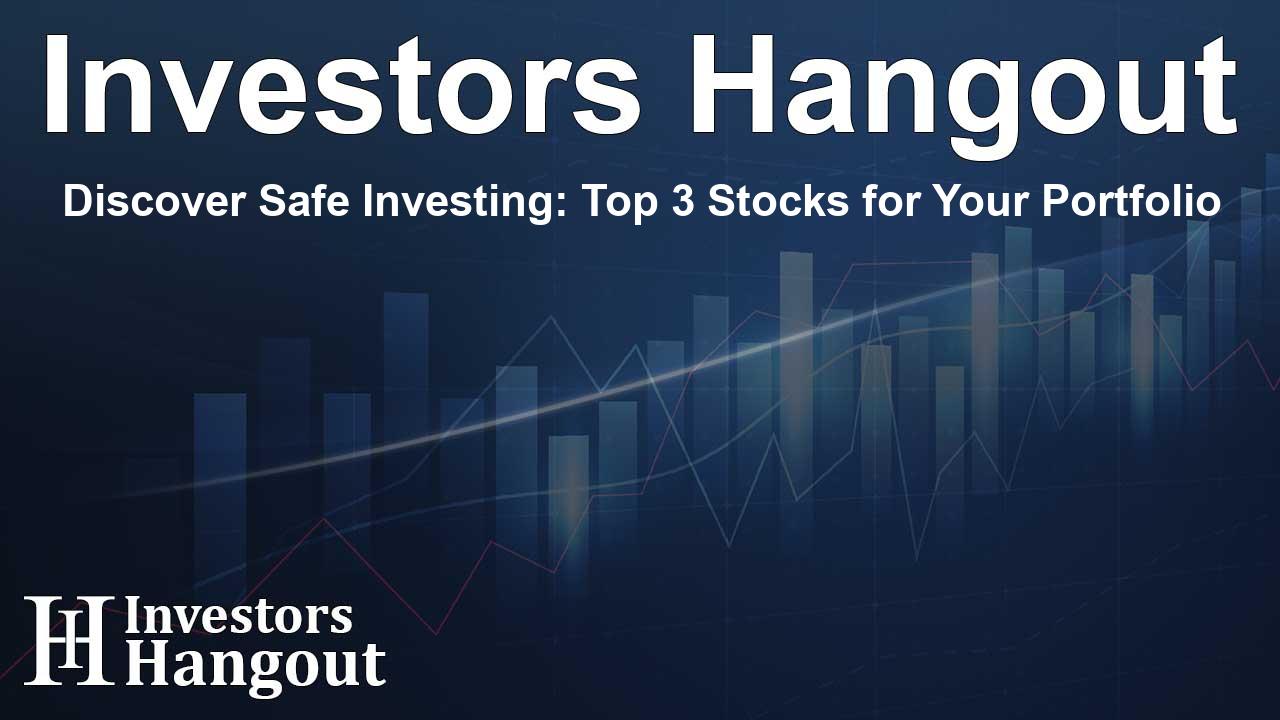Discover Safe Investing: Top 3 Stocks for Your Portfolio

Understanding Risk-Averse Investing
In the world of investing, not every decision revolves around chasing high returns. For some investors, the top priority is to preserve their capital while still enjoying a stable income. This approach is known as risk aversion, and it plays a significant role in how a portfolio is structured to limit volatility and protect against potential losses.
The Allure of Stability in Risk-Averse Stocks
Risk-averse investors typically gravitate towards assets that promise lower fluctuations in value. Instead of seeking out high-risk, high-reward opportunities, they look for investments that can steadily grow over time, providing peace of mind. This strategy often leads them to established companies with robust financial metrics and a history of stable returns.
Certain sectors stand out as havens for investors seeking risk-averse stocks. Utilities, for instance, are always in demand, whether the economy is booming or struggling. Essential services like electricity and water continue to keep their revenue streams steady, thus reducing the risk for investors. Similarly, the consumer staples and healthcare sectors offer companies with consistently needed products and services, making them reliable choices during economic fluctuations.
1. NextEra Energy: Leading the Charge in Clean Energy
NextEra Energy (NYSE: NEE) stands out as a key player in the renewable energy sector. As a leading provider of clean energy solutions, NextEra Energy is focused on sustaining the planet while delivering reliable returns to its investors. With its subsidiary, Florida Power & Light Company, it dominates the electric utility field, ensuring stable growth and consistent demand for its energy products.
This company is making strides towards a cleaner future through substantial investments in solar and wind energy. NextEra's strategic emphasis on renewable resources has garnered a strong and growing portfolio of energy projects. With a current dividend yield of 2.46%, NextEra Energy represents a secure option for those interested in steady income while supporting sustainable practices.
2. Procter & Gamble: A Household Name with Reliable Dividends
Procter & Gamble (NYSE: PG) is synonymous with top-quality consumer goods, providing stability through its extensive range of trusted brands including Tide, Pampers, and Crest. With a remarkable history of dividend increases stretching over 69 years, the company exemplifies financial reliability and shareholder commitment.
Procter & Gamble's recent performance underscores its operational excellence and ability to adapt to shifting market conditions, demonstrating organic sales growth fueled by strategic pricing and volume increases. Its consistent dividend yield of approximately 2.39% makes P&G an appealing choice for investors seeking both stability and regular income.
3. Johnson & Johnson: A Legacy of Healthcare Innovation
Johnson & Johnson (NYSE: JNJ) operates across multiple segments of the healthcare industry, including pharmaceuticals, consumer health products, and medical devices. This diversification affords the company a resilient stance against economic fluctuations, ensuring steady demand for its offerings.
The organization invests heavily in innovative treatments and medical advancements, particularly in high-growth areas like oncology and immunology. With consistent dividend growth and robust financial health, Johnson & Johnson maintains its reputation as a safe investment choice for those who seek security in healthcare.
Building a Balanced and Resilient Investment Portfolio
Investing in risk-averse stocks can be a strategic decision for those looking to build a portfolio centered around security and consistent returns. While these investments may not provide the explosive growth some seek, they do promise stability and reliability, making them integral in any well-rounded portfolio. Remember, blending risk-averse stocks with growth-oriented investments can create a balanced investment strategy, allowing you to capitalize on both consistent income and potential growth opportunities.
Frequently Asked Questions
What are risk-averse stocks?
Risk-averse stocks are investments that prioritize stability and consistent returns over high-growth potential. They are typically less volatile and provide reliable income through dividends.
Why invest in risk-averse stocks?
Investing in risk-averse stocks can help protect your capital during market fluctuations, providing a sense of security and stability while still allowing for potential growth.
How do risk-averse stocks perform in economic downturns?
Risk-averse stocks tend to perform better in economic downturns as they offer essential services or products that maintain consistent demand, making them more resilient during tough times.
What sectors are known for risk-averse stocks?
Common sectors that feature risk-averse stocks include utilities, consumer staples, and healthcare, as they generally provide goods and services that are always in demand.
What dividend yield is considered attractive in risk-averse stocks?
A dividend yield above 2% is often considered attractive in risk-averse stocks, as it provides investors with regular income alongside the potential for value appreciation.
About The Author
Contact Henry Turner privately here. Or send an email with ATTN: Henry Turner as the subject to contact@investorshangout.com.
About Investors Hangout
Investors Hangout is a leading online stock forum for financial discussion and learning, offering a wide range of free tools and resources. It draws in traders of all levels, who exchange market knowledge, investigate trading tactics, and keep an eye on industry developments in real time. Featuring financial articles, stock message boards, quotes, charts, company profiles, and live news updates. Through cooperative learning and a wealth of informational resources, it helps users from novices creating their first portfolios to experts honing their techniques. Join Investors Hangout today: https://investorshangout.com/
The content of this article is based on factual, publicly available information and does not represent legal, financial, or investment advice. Investors Hangout does not offer financial advice, and the author is not a licensed financial advisor. Consult a qualified advisor before making any financial or investment decisions based on this article. This article should not be considered advice to purchase, sell, or hold any securities or other investments. If any of the material provided here is inaccurate, please contact us for corrections.
